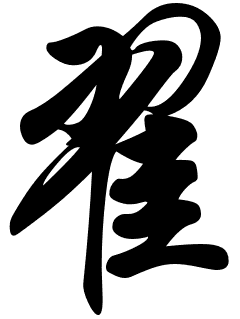Chinese surnames are used by Han Chinese and Sinicized ethnic groups in Mainland China, Hong Kong, Macau, Malaysia, Brunei, Taiwan, Korea, Singapore, Indonesia, Philippines, Vietnam and among overseas Chinese communities. In ancient times two types of surnames existed, namely xing or clan names, and shi or lineage names.
The Hundred Family Surnames is a classic Chinese text composed of common Chinese surnames. The book was composed in the early Song dynasty. It originally contained 411 surnames, and was later expanded to 504. Of these, 444 are single-character surnames, and 60 are double-character surnames. About 800 names have been derived from the original ones.
Gong is a surname which can be found throughout Eurasian continent. It is the English transcription of a number of different Chinese surnames: 江, 宫, 龔, 共, 公, 鞏, 功, 貢, and 弓. Gong may also be a Korean surname, but this Korean Gong may be the English transcription of another surname Kong (孔).

Mao is the romanization of several Chinese family names, including common names 毛 (Máo), 茅 (Māo) and some rare names 茆 (Máo), 卯 (Máo), 貌 (Mào) etc.

Jǐ is the Mandarin pinyin romanization of the Chinese surname written 纪 in simplified Chinese and 紀 in traditional Chinese. It is romanized as Chi in Wade–Giles, and Kei in Cantonese. Ji is the 136th most common surname in China, with a population of 1.1 million. It is listed 122nd in the Song dynasty classic text Hundred Family Surnames.

Jí is the Mandarin pinyin romanization of the Chinese surname written 汲 in Chinese character. It is romanized as Chi in Wade–Giles, and Kap in Cantonese. Ji is listed 213th in the Song dynasty classic text Hundred Family Surnames. It is not among the 300 most common surnames in China.

Jí is the Mandarin pinyin romanization of the Chinese surname written 籍 in Chinese character. It is romanized as Chi in Wade–Giles, and Zik in Cantonese. Ji is listed 275th in the Song dynasty classic text Hundred Family Surnames. It is not among the 300 most common surnames in China.

Zhai is the Mandarin pinyin romanization of the Chinese surname written 翟 in Chinese character. It is romanized Chai in Wade–Giles, and Chak in Cantonese. It is listed 292nd in the Song dynasty classic text Hundred Family Surnames. As of 2008, it is the 120th most common surname in China, shared by 1.4 million people.

Zhuo is the Mandarin pinyin romanization of the Chinese surname written 卓 in Chinese character. It is romanized Cho in Wade–Giles, Cheuk in Cantonese, and Toh in Teochew and Hokkien. Zhuo is listed 277th in the Song dynasty classic text Hundred Family Surnames. As of 2008, it is the 224th most common surname in China, shared by 360,000 people.

Pi is the Mandarin pinyin romanization of the Chinese surname written 皮 in Chinese character. It is romanized P'i in Wade–Giles, and Pei in Cantonese. Pi is listed 85th in the Song dynasty classic text Hundred Family Surnames. It is not among the 300 most common surnames in China.

Ping is the Mandarin pinyin romanization of the Chinese surname written 平 in Chinese character. It is romanized P'ing in Wade–Giles. Ping is listed 95th in the Song dynasty classic text Hundred Family Surnames. It is not among the 300 most common surnames in China.

Zang is the Mandarin pinyin romanization of the Chinese surname written 臧 in Chinese character. It is romanized Tsang in Wade–Giles. It is listed 112th in the Song dynasty classic text Hundred Family Surnames. As of 2008, it is the 241st most common surname in China, shared by 310,000 people.

Ai is the Mandarin pinyin and Wade–Giles romanization of the Chinese surname written 艾 in Chinese character. It is listed 334th in the Song dynasty classic text Hundred Family Surnames. As of 2008, it is the 215th most common surname in China, shared by 400,000 people.

Ru is the Mandarin pinyin romanization of the Chinese surname written 茹 in Chinese character. It is romanized Ju in Wade–Giles, and Yu in Cantonese. Ru is listed 331st in the Song dynasty classic text Hundred Family Surnames. It is not among the 300 most common surnames in China.

Zha is the Mandarin pinyin romanization of the Chinese surname written 查 in Chinese character. It is romanized as Cha in Wade–Giles. Zha is listed 397th in the Song dynasty classic text Hundred Family Surnames. As of 2008, it is the 176th most common surname in China, shared by 680,000 people.
Sha is the Mandarin pinyin and Wade–Giles romanization of the Chinese surname written 沙 in Chinese character. It is listed 387th in the Song dynasty classic text Hundred Family Surnames. As of 2008, it is the 216th most common surname in China, shared by 400,000 people.

Sheng is the Mandarin pinyin and Wade–Giles romanization of the Chinese surname written 盛 in Chinese character. It is romanized as Shing in Cantonese. Sheng is listed 146th in the Song dynasty classic text Hundred Family Surnames. As of 2008, it is the 175th most common surname in China, shared by 700,000 people.

Min is the Mandarin pinyin and Wade–Giles romanization of the Chinese surname written 闵 in simplified Chinese and 閔 in traditional Chinese. It is romanized Man in Cantonese. Min is listed 132nd in the Song dynasty classic text Hundred Family Surnames. As of 2008, it is the 193rd most common surname in China, shared by 520,000 people.
Luan is the Mandarin pinyin and Wade–Giles romanization of the Chinese surname written 栾 in simplified Chinese and 欒 in traditional Chinese. Luan is listed 243rd in the Song dynasty classic text Hundred Family Surnames. As of 2008, it is the 226th most common surname in China, shared by 360,000 people.

Diao is the Mandarin pinyin romanization of the Chinese surname written 刁 in Chinese character. It is romanized as Tiao in Wade–Giles. Diao is listed 148th in the Song dynasty classic text Hundred Family Surnames. As of 2008, it is the 245th most common surname in China, shared by 300,000 people.















